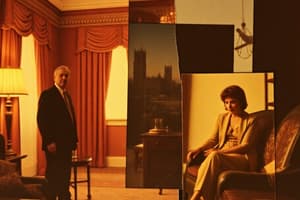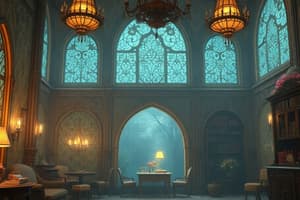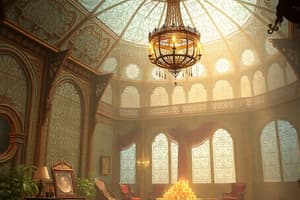Podcast
Questions and Answers
What is the responsibility of the cinematographer?
What is the responsibility of the cinematographer?
Lighting
What are the two types of lighting?
What are the two types of lighting?
- Low Key Lighting
- High Key Lighting
- Natural lighting (correct)
- Studio Lighting (correct)
Low Key lighting is brightly lit and easily visible.
Low Key lighting is brightly lit and easily visible.
False (B)
High Contrast lighting is a type of lighting that blends light and darkness together.
High Contrast lighting is a type of lighting that blends light and darkness together.
Who is responsible for the color choices on set?
Who is responsible for the color choices on set?
The editor has little control over color grading.
The editor has little control over color grading.
What color can represent sadness and coldness?
What color can represent sadness and coldness?
What color can represent growth and wealth?
What color can represent growth and wealth?
Black and white photography emphasizes external action.
Black and white photography emphasizes external action.
Over-saturation is making colors dull and muted.
Over-saturation is making colors dull and muted.
What is the process of desaturation in film?
What is the process of desaturation in film?
Atmospheric color is when the local color of an object is affected by the environment.
Atmospheric color is when the local color of an object is affected by the environment.
What is the term for the unaltered color of an object?
What is the term for the unaltered color of an object?
Receding colors, such as beiges and grays, are eye-catching.
Receding colors, such as beiges and grays, are eye-catching.
What is a light motif in color?
What is a light motif in color?
What is an example of an ironic use of color in film?
What is an example of an ironic use of color in film?
What is the name of the cinematographer?
What is the name of the cinematographer?
What is cinematic syntax?
What is cinematic syntax?
What does blocking refer to in film?
What does blocking refer to in film?
Low angle is when the camera is above looking down.
Low angle is when the camera is above looking down.
What term describes the meaning or significance of a shot in film?
What term describes the meaning or significance of a shot in film?
Pragmatics refers to the context surrounding a shot, influencing its meaning.
Pragmatics refers to the context surrounding a shot, influencing its meaning.
What is ‘suture’ in film?
What is ‘suture’ in film?
Which of these are subjective POV shots?
Which of these are subjective POV shots?
A dirty shoulder shot is an indirect subjective POV.
A dirty shoulder shot is an indirect subjective POV.
An incomplete POV shot requires only one shot.
An incomplete POV shot requires only one shot.
What is a found POV shot?
What is a found POV shot?
What is an objective POV shot?
What is an objective POV shot?
A slow zoom is a quick zoom in on an object.
A slow zoom is a quick zoom in on an object.
What is a director's POV shot?
What is a director's POV shot?
An extreme high angle is a shot from directly above, also known as a god POV.
An extreme high angle is a shot from directly above, also known as a god POV.
What is a long take/continuous take?
What is a long take/continuous take?
What is a shot that has both characters in a conversation?
What is a shot that has both characters in a conversation?
A shot reverse shot is a quick cut back and forth between two characters.
A shot reverse shot is a quick cut back and forth between two characters.
What is a shaky camera/handheld camera?
What is a shaky camera/handheld camera?
What are composition lines?
What are composition lines?
Perpendicular lines suggest dynamic movement and action.
Perpendicular lines suggest dynamic movement and action.
What is foreground framing?
What is foreground framing?
Fixed camera movements include panning and tilting.
Fixed camera movements include panning and tilting.
What type of camera movement moves horizontally?
What type of camera movement moves horizontally?
A tracking shot is a dolly shot that moves back and forth along a horizontal plane.
A tracking shot is a dolly shot that moves back and forth along a horizontal plane.
What is a camera movement that moves vertically?
What is a camera movement that moves vertically?
Deep focus is when only one thing is in focus.
Deep focus is when only one thing is in focus.
What is a rack focus?
What is a rack focus?
What is a soft focus lens?
What is a soft focus lens?
A wide angle lens is also known as a fish-eye lens.
A wide angle lens is also known as a fish-eye lens.
What is the golden hour in film?
What is the golden hour in film?
What is a cutaway in film?
What is a cutaway in film?
What is the key concept behind Soviet editing techniques?
What is the key concept behind Soviet editing techniques?
The Kuleshov experiment demonstrates the power of editing to create emotional impact.
The Kuleshov experiment demonstrates the power of editing to create emotional impact.
What is continuity editing?
What is continuity editing?
Discontinuity editing often intentionally confuses the viewer.
Discontinuity editing often intentionally confuses the viewer.
Flashcards
Cinematography
Cinematography
The art and technique of using light and camera movements to create visual imagery in film.
High Key Lighting
High Key Lighting
A scene brightly lit, making everything clearly visible.
Low Key Lighting
Low Key Lighting
A scene with significant darkness and shadows.
Color Symbolism
Color Symbolism
Signup and view all the flashcards
Black and White Film
Black and White Film
Signup and view all the flashcards
Saturation
Saturation
Signup and view all the flashcards
Over Saturation
Over Saturation
Signup and view all the flashcards
Desaturation
Desaturation
Signup and view all the flashcards
Atmospheric Color
Atmospheric Color
Signup and view all the flashcards
Local Color
Local Color
Signup and view all the flashcards
Advancing Colors
Advancing Colors
Signup and view all the flashcards
Receding Colors
Receding Colors
Signup and view all the flashcards
Light Motif
Light Motif
Signup and view all the flashcards
Cinematic Syntax
Cinematic Syntax
Signup and view all the flashcards
Blocking
Blocking
Signup and view all the flashcards
Low Angle
Low Angle
Signup and view all the flashcards
High Angle
High Angle
Signup and view all the flashcards
POV Shot
POV Shot
Signup and view all the flashcards
Montage
Montage
Signup and view all the flashcards
Crosscutting
Crosscutting
Signup and view all the flashcards
Continuity Editing
Continuity Editing
Signup and view all the flashcards
Jump Cut
Jump Cut
Signup and view all the flashcards
Close-up
Close-up
Signup and view all the flashcards
Study Notes
Lighting
- Cinematographers are responsible for lighting.
- Directors and cinematographers collaborate.
- Natural lighting uses existing light sources (sun, moon, etc.).
- Studio lighting is controlled by technicians.
- Low key lighting creates shadows.
- High key lighting is brightly lit.
- High contrast lighting uses light and dark.
- Chiaroscuro lighting uses dramatic contrast.
Color
- Visual design manages colors in a film.
- Production design handles on-set color choices.
- Cinematography and editing crews control color using cameras and grading.
- Colors evoke specific emotions:
- Red: anger, violence, love, passion
- Blue: sadness, cold, purity, tranquility
- Yellow: happiness, cowardice, heat, hope
- Green: nature, sickness, growth, envy, greed
- Purple: royalty, death, rarity
- Orange: warmth, coziness
- Brown: nature, earth, reliability
Black and White Photography
- Black and white de-emphasizes external action, emphasizing internal action.
- Flashbacks are often in black and white to focus on events.
Saturation
- Over-saturation makes colors overly vibrant.
- Desaturation lessens color intensity in editing.
- Neutral colors look consistent between set and film.
Atmospheric Color
- Atmospheric color modifies a subject's color based on the environment.
- Local color is the subject's inherent color.
Advancing and Receding Colors
- Advancing colors are bright and attention-grabbing.
- Receding colors (beige, gray) are less noticeable.
Light Motif in Color
- Repeated colors create associations with themes across a film.
Expressionism and Ironic/Surrealistic Color Use
- Expressionism uses color to express emotion.
- Ironic color use is unexpected color choice.
- Surrealistic color use breaks established color palettes.
Cinematography
-
Cinematographer is the director of photography.
-
Visual language separates film from other art forms.
-
Cinematic syntax is the order of information in a scene.
-
Blocking arranges people and objects within the frame.
-
Semantics determines a shot's meaning.
-
Low and high angles create specific effects.
-
Pragmatics affects shot meaning based on context.
-
Perspective/Suture is point of view.
-
Subjective POV creates a strong connection.
-
Eye-line shot, pure POVs, subjective POVs illustrate perspective.
-
Breaking the fourth wall involves character interaction with the audience.
-
Dirty shoulder creates a documentary feel.
-
Incomplete POV uses multiple shots.
-
Found POV shows the viewpoint through the source.
-
Objective POV is neutral and unbiased.
-
Slow zoom focuses slowly on an object.
-
Director POV highlights a specific element.
-
Extreme high angle/God POV is very high or directly from above.
-
Long take/continuous take is an extended shot.
-
Close-up (neck up), medium shot (hips up). long shot (subject far away/ surrounded by environment)
-
Two shot, three shot, group shot for number of characters framed.
-
Shot over shot and master shot use two scenes.
-
Shot reverse shot showcases conversation.
-
Shaky cam simulates authenticity or emotion.
-
Composition lines (perpendicular, diagonal, curved) create visual effect.
-
Foreground framing emphasizes elements in the background.
-
Fixed camera allows panning and tilting.
-
Camera movement includes dolly/tracking, crane shots.
-
Dolly zoom shows spatial relationship between foreground and background.
-
Deep focus: everything in focus.
-
Shallow focus: one thing in focus.
-
Rack focus: changing focus within a shot
-
Soft focus: diffuses light.
-
Wide-angle/fisheye lens expands visual field.
-
Golden hour refers to filming at daylight.
Production design
- Film adaptations often use set design to establish character status.
- Camera angles show character importance.
- Lighting creates tone changes in a scene.
Editing
- Soviet editing techniques apply to modern films.
- The Kuleshov experiment used montage.
- Editing creates emotional impact.
- Continuity editing is clear and predictable (Hollywood style).
- Discontinuity editing is deliberately challenging.
- Montage (explanatory/intellectual) condenses/compares scenes.
- Intercutting changes between scenes/images.
- Crosscutting uses different locations in parallel.
- Fade in/out transitions gradually show/hide images.
- Dissolve/fade smoothly shows transitions.
- Form cut: matching scene compositions.
- Hard cut: abrupt transition.
- Smash cut: sudden, abrupt end.
- J-cut: sound from old scene lingers.
- L-cut: sound from new scene begins.
- Iris wipe: circular transition effect.
- Ellipsis shows gaps in time.
- Jump cuts quickly advances time.
- Flash cuts rapidly advance time/action.
- Split screen shows multiple views.
- Composite editing combines frames.
- Superimposed (imposition) editing has one image layering over another.
- Thawed frame moves a still image.
- Still shots, slow-motion, fast motion
- Time-lapse
Sound Design
- Sound sets film tone.
- Sound mixer collects sound during filming
- Sound editor, sound desginer work in post-production.
- Foley artists create sound effects.
- Ambient sounds are natural to the environment.
- Preferred sound effect emphasizes a sound.
- Expressionism through sound manipulates sound.
- Distorted sound intentionally alters sounds.
- Echo repeats sounds.
- Silence is a sound effect.
- Cut on sound emphasizes effects.
- Non-diegetic sound comes from outside the film.
- Sound as symbol has literal and figurative meaning.
- 3D sound emphasizes screen space.
- ADR (Audio dialogue replacement) corrects dialogue.
- Slow-motion sound usually accompanies slow-motion.
Dialogue
- Dialogue can be monosyllabic or polysyllabic.
Score
- Composers create new music.
- Musical supervisors secure music rights.
- Music associates with film themes.
- Mickey mousing synchronizes music with actions.
- Peter and the wolfing associates music with characters.
- Diegetic score is audible to characters.
- Symbolic score represents themes.
- Ironic score contrasts actions and music.
- Expressionism in score shows internal character states.
- Initial score sets tone.
Animation
- Animation is expensive before Snow White.
- Each frame is set individually.
- Animation, not just children's animation.
- Key frame animation are important frames.
- In-betweens fill animation gaps.
- Stop-motion adjusts figures in each frame.
- Puppet animation use maniputable figures.
- Claymation uses clay.
- Japanese anime expresses culture/identity.
- Post-humanism explores beyond human limits.
- Mocap (Motion Capture) animates from actor’s body movements.
- Pixelation uses everyday objects to convey life.
- Expressionist animation expresses emotion.
Style and Director
- Auteur style expresses director personality
- Pedro Almodòvar's style blends Spanish elements with Hollywood techniques.
- Fantastic Realism (genre) blends realism with exaggeration.
- Color choices contribute to satire in Almodòvar's films.
- Films often use intertextuality and mise-en-abyme.
- Marginalized characters are not story drivers; they represent character identity.
Genres
- Genre conventions describe rules and patterns.
- Iconography describes genre aesthetics.
- Horror/SciFi/Fantasy share common roots in fear (of body, technology, culture).
- Horror films depict monsters representing ideas or societal conflict.
- Settings align with subgenres.
Studying That Suits You
Use AI to generate personalized quizzes and flashcards to suit your learning preferences.




